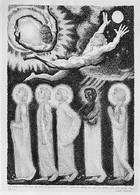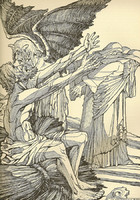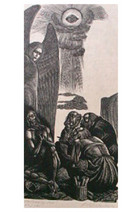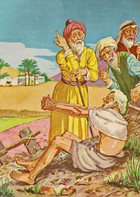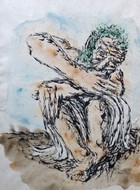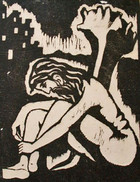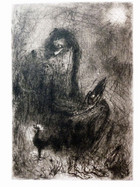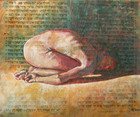Job the Long-suffering
(Job 1:6-12, 20-22; 2:4-10; 10:1-7; 14:1-6; 19:23-27; 23:3-6; 38:1-7; 40:8-9; 42:3-6, 10, 12, 16. JPS)
One day the divine beings presented themselves before the LORD, and the Adversary came along with them.
The LORD said to the Adversary, “Where have you been?”
The Adversary answered the Lord, “I have been roaming all over the earth.”
The LORD said to the Adversary, “Have you noticed My servant Job? There is no one like him on earth, a blameless and upright man who fears God and shuns evil!”
The Adversary answered the LORD, “Does Job not have good reason to fear God? Why, it is You who have fenced him round, him and his household and all that he has. You have blessed his efforts so that his possessions spread out in the land. But lay Your hand upon all that he has and he will surely blaspheme You to Your face.”
The LORD replied to the Adversary, “See, all that he has is in your power, only do not lay a hand on him.”
The Adversary departed from the presence of the LORD.
Disasters strike Job in quick succession. A messenger comes to tell him all his oxen and she-asses have been carried off by raiding Sabeans and their keepers put to the sword. He is still speaking when a second eyewitness appears to inform Job his flocks of sheep and their shepherds have been consumed in fire from heaven. A third man appears with the report that all Job's camels have been stolen by a formation of Chaldeans. The words are barely spoken before a fourth messenger comes with the most bitter news of all. Job’s seven sons and three daughters were eating and drinking together in the house of the eldest brother, when a mighty wind from the wilderness brought down the walls and all were killed.
Then Job arose, tore his robe, cut off his hair, and threw himself on the ground and worshiped.
He said, “Naked came I out of my mother’s womb, and naked shall I return there; the LORD has given, and the LORD has taken away; blessed be the name of the LORD.”
For all that, Job did not sin nor did he cast reproach on God.
The Adversary appears again at the divine assembly. God tells the Adversary that he has put Job to the test for no good reason. The righteous man has stayed faithful and kept his integrity. The Adversary has a new trial in mind for Job. He wants to attack him directly. God consents.
The Adversary answered the LORD, “Skin for skin--all that a man has he will give up for his life. But lay a hand on his bones and his flesh, and he will surely blaspheme you to your face.”
So, the Lord said to the Adversary, “See, he is in your power; only spare his life."
The Adversary departed from the presence of the LORD and inflicted a several inflammation on Job from the sole of his foot to the crown of his head. He took a potsherd to scratch himself as he sat in the ashes.
His wife said to him, “You still keep your integrity! Blaspheme God and die!”
But he said to her, “You talk as any shameless woman might talk! Should we accept only good from God and not accept evil?”
For all that, Job said nothing sinful.
Three friends of Job--Eliphaz, Bildad, and Zophar--hear of his calamities and come to console him. They sit beside him on the ground in silence for seven days and nights. When Job finally speaks, they offer him a conventional theological response. He could not possibly be suffering without good cause. He has brought these trials and tribulations upon himself because of his wrongdoing. As the text shifts from prose to poetry, Job defiantly maintains his innocence and calls the Almighty to account for this injustice.
I am disgusted with life;
I will give rein to my complaint,
Speak in the bitterness of my soul.
I say to God, “Do no condemn me;
Let me know what You charge me with.
Does it benefit You to defraud,
To despise the toil of Your hands,
While smiling on the counsel of the wicked?
Do You have eyes of flesh?
Is Your vision that of mere man?
Are Your days the days of a mortal,
Are Your years the years of a man,
That You seek my iniquity
And search out my sin?
You know that I am not guilty,
And there is none to deliver from Your Hand.
Man born of woman is short-lived and sated with trouble.
He blossoms like a flower and withers;
He vanishes like a shadow and does not endure.
His days are determined;
You know the number of his months;
You have set him limits that he cannot pass.
Turn away from him, that he may be at ease
Until, like a hireling, he finishes out his day.
O that my words were written down;
Would they were inscribed in a record,
Incised on a rock forever
With iron stylus and lead!
But I know that my Vindicator lives;
In the end He will testify on earth--
This, after my skin will have been peeled off.
But I would behold God while still in my flesh,
I myself, not another, would behold Him;
Would see with my own eyes:
Would that I knew how to reach Him,
How to get to His dwelling-place.
I would set out my case before Him
And fill my mouth with arguments.
I would learn what answers He had for me
And know how He would reply to me.
The Almighty responds to Job’s plea and appears before him, bringing the fruitless debate with the False Comforters to an end. Instead of answering Job’s charges, God gives him a lesson in humility. God points to the mysteries of creation from the stars of Pleiades and Orion in the heavens to mighty creatures like the Behemoth and Leviathan on earth and asks what role Job played in bringing these into being. Job humbly repents for his outburst against GOD.
Then the LORD replied to Job out of the tempest and said:
Who is this who darkens counsel,
Speaking without knowledge?
Gird your loins like a man:
I will ask and you will inform Me.
Where were you when I laid the earth’s foundations?
Speak if you have understanding.
Do you know who fixed its dimensions
Or who measured it with a line?
Onto what were its bases sunk?
Who set its cornerstone
When the morning stars sang together
And all the divine beings shouted for joy?
Would you impugn My justice?
Would you condemn Me that you may be right?
Have you an arm like God’s?
Can you thunder with a voice like His?
Job said in reply to the LORD:
Indeed, I spoke without understanding
Of things beyond me, which I did not know.
Hear now, and I will speak;
I will ask and You will inform me.
I had heard You with my ears,
But now I see You with my eyes;
Therefore, I recant and relent,
Being but dust and ashes.
God puts Job is his place, but in a prose epilogue to the narrative, he also rebukes the False Comforters for not speaking truthfully about God as Job has done and orders them to offer a sacrifice in atonement for their false sayings. God also asks Job to pray for them, promising not to punish them for his sake. At the end of the story, God shows favor to Job and rewards him for his honesty and integrity.
The LORD restored Job’s fortunes when he prayed on behalf of his friends, and the LORD gave Job twice what he had before. Thus the LORD blessed the latter years of Job’s life more than the former. Afterward, Job lived one hundred and forty years to see four generations of sons and grandsons. So Job died old and contented.
The Jewish Publication Society TANAKH Translation in The Jewish Study Bible (Oxford University Press: 2004)
